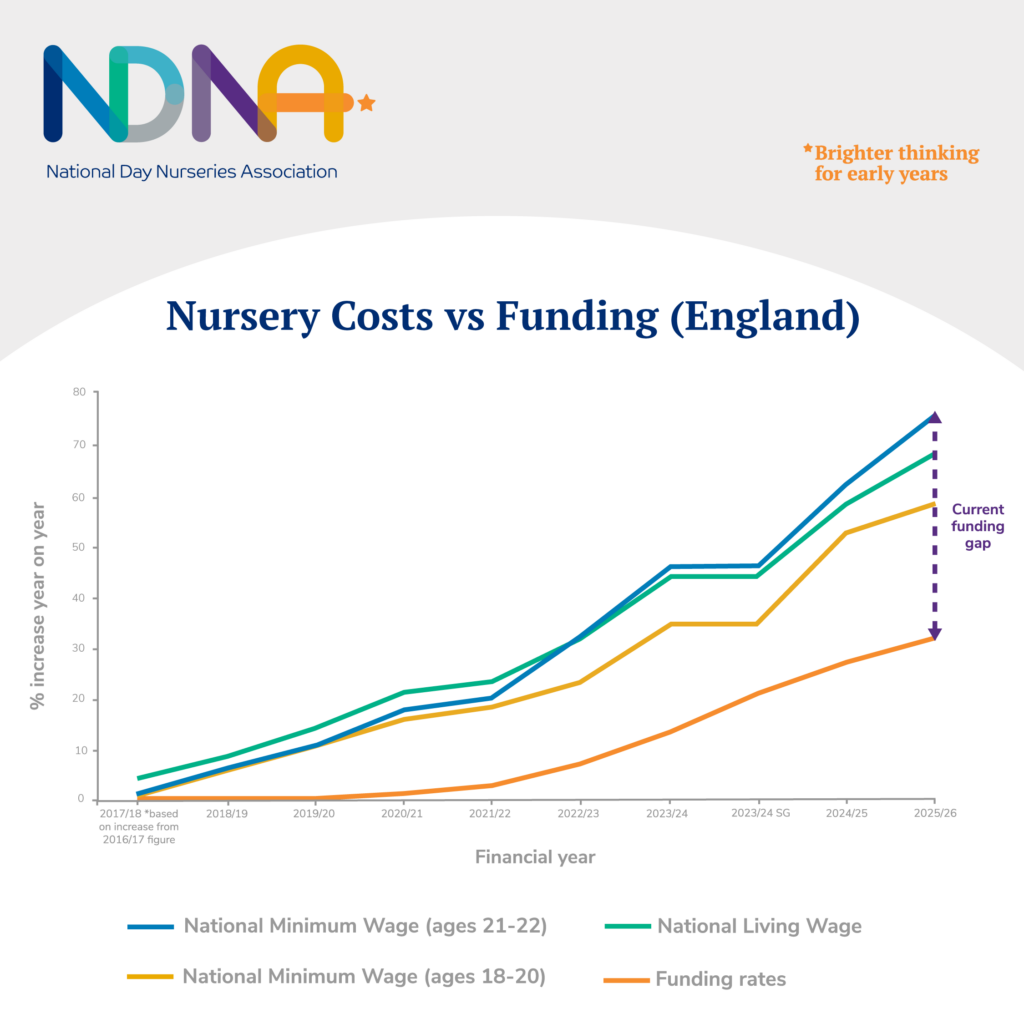
England funding rates 2025-26: won’t factor in National Insurance Contributions
The Department for Education has published the funding rates for April 2025-26 but these won’t include an uplift to account for the increase in National Insurance Contributions announced in the October Budget.
The average funding rate for three and four-year-olds – which has the most impact on nurseries as there are more funded three and four-year-olds currently – will increase by only 4.1%. From April the statutory minimum wages will rise by between 6.7% and 18% meaning that a new 96% pass-through rate would have little impact on the overall funding to providers.

Summary of announcements
DfE has provided average funding rates to local authorities which will be:
- Three and four-year-olds – £6.12 (currently £5.88) = up by 24p or 4.1%
- Two-year-olds – £8.53 (currently £8.28) = up by 25p or 3.3%
- Under twos – £11.54 (currently £11.22) = up by 32p or 3.4%
See below for a breakdown of funding rates by local authority. These are average increases and these vary at local level. In real terms, the funding rates have increased by 32.7% since 2017 but statutory minimum wages have risen by 66 – 70%.
The DfE said that the latest funding rates for 2025-26 factor in wage increases, cost of living increases and average earnings growth, but not NIC increases. Local authorities will be expected to publish their local rates by 28 February 2025 at the latest.
The Treasury confirmed that it will reimburse schools and maintained nurseries for National Insurance Contributions (NICs) but this will not include private or voluntary providers.
The DfE also announced £100m additional spending which will include a £75m expansion grant to increase childcare places and support the workforce to deliver the 30 hours of funded childcare from September 2025. This additional revenue will be distributed to providers via local authorities but details of how this will take place and who will be included won’t be announced until the new year.
The remaining £25m will be used to increase the Early Years Pupil Premium (EYPP) from 68p to £1 per hour. This equates to paying £570 per child per year to help children from disadvantaged backgrounds, an increase of 45%.
Purnima Tanuku OBE Chief Executive of National Day Nurseries Association (NDNA) said: “These new funding rates and the announcement today makes it clear that the Treasury does not appreciate the contribution which the private and voluntary early years sector makes to both enhance the life chances of our youngest children and to grow the economy.
“For nurseries in England, National Insurance Contributions and salary increases will add £2,600 a year per employee, £47,000 on average per nursery and 11% increase to overall staffing costs.
“These rates do not even cover the statutory wage increases. Since 2019 minimum wages have shot up by 66 – 70% but average funding rates have only risen by 32.7%. On top of this the National Insurance Contributions increase is going to cripple providers and the only way they can cover these costs is by increasing parental fees.
“Public sector providers will get reimbursed for their National Insurance Contributions increase, but the private and voluntary sector – which delivers three quarters of funded places – will not be helped at all. There is a clear lack of equity between the private and public sector providers. Public sector providers are also reimbursed for unfair business rates while private providers on average pay £21,000 per year.
“We do welcome the increase in Early Years Pupil Premium to £570 which is something we have been campaigning for. It is good to see this uplift, but it is still not at the level of primary school Pupil Premium which is currently £1,455. The Government’s rhetoric about early years must match their investment which saves millions in a child’s later years.
“Despite all the financial and workforce challenges early years providers face, they are delivering high quality early education and care, supporting families and their children and preparing for the big expansion of funded childcare next year.
“An additional £75m has been announced to support the expansion, but there are no further details on how this money will be allocated. This is unlikely to allay any fears and local authorities must ensure this funding is passed on directly to providers.
“The combination of all these factors will be the last straw for some nurseries which will result in more settings closing rather than expanding to meet expected demand. The Government must act urgently to exempt all private and voluntary early years providers from paying the National Insurance Contribution increases.”
NDNA has looked at the actual rates that will be paid to councils for three and four-year-olds:
- There is a wide range of funding rate increases from 1.4% in Kensington and Chelsea to 5.4% in Knowsley
- A total of 50 local authorities have the lowest funding rate of £5.71
- The highest rate is in Camden – £9.23, an increase of 2.1%
NDNA analysed the rates for two-year-olds and found that:
- The lowest funding rate will be £7.23 in Rutland rising to £12.43 in Westminster. This is more than a £5 range of rates across English local authorities
- A total of 35 local authorities will be paid less than £8 per child per hour
- The lowest increase is 0.5% in Sutton but a 6.1% increase in Bristol
In reviewing the rates for the under twos, NDNA revealed that:
- The range is more than £7 from the lowest to the highest rates
- The lowest will be £9.76 in Rutland rising to £17.44 in Westminster
- The increases range from 0.5% in Sutton to 7.6% in Westminster
- Forty five LAs will be given less than £11 per child per hour
Secretary of State for Education, Bridget Phillipson said:
“High quality early education is the cornerstone of our promise to ensure tens of thousands of children are school ready every year, as part of the government’s Plan for Change.
“Despite the inherited challenges we face, this government will invest in our children’s future to break the link between background and success and build a system that gives every child the best start in life.
“The early years has been my priority from day one, because by giving more children the chance to start school ready to go, we transform their life chances, and the life chances of every child in their classroom.”
- England
Similar Articles
Maths confidence soars as three early years settings complete NDNA’s Maths Champions programme

Government guidance could put nursery children and staff at risk


